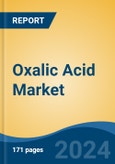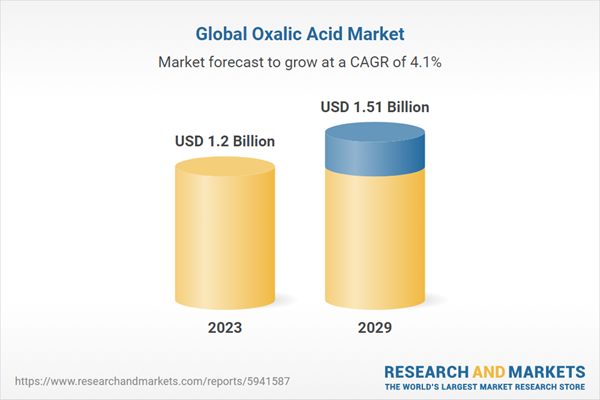Speak directly to the analyst to clarify any post sales queries you may have.
10% Free customizationThis report comes with 10% free customization, enabling you to add data that meets your specific business needs.
Beyond its industrial applications, oxalic acid also acts as a natural cleaning agent, harnessing the power of nature to clean and sanitize. Its eco-friendly attributes make it increasingly popular among environmentally conscious consumers. As awareness grows about the benefits of using sustainable cleaning agents, the demand for oxalic acid is expected to rise steadily. Moreover, oxalic acid plays a vital role in the pharmaceutical industry. It serves as a crucial raw material in the production of various pharmaceutical products, including antibiotics, antiseptics, and bleaching agents. For example, it is a key component in the manufacturing of ciprofloxacin, a widely used antibiotic that effectively treats diverse bacterial infections. Additionally, oxalic acid is utilized in the production of antiseptics like potassium permanganate solution, which is renowned for its effectiveness in treating skin conditions such as eczema and fungal infections. The multifaceted applications of oxalic acid underscore its significance in diverse industries, where its unique properties and versatility make it an indispensable component for various processes and products.
Key Market Drivers
Growing Demand of Oxalic Acid in Pharmaceutical Industry
The pharmaceutical and healthcare sectors are experiencing rapid global growth, creating a burgeoning market for oxalic acid manufacturers. This trend is primarily driven by the extensive use of oxalic acid as a reagent in pharmaceutical research and development (R&D) activities. Oxalic acid, with its unique chemical properties, plays a crucial role in the production of certain drugs, including antibiotics and other pharmaceuticals. Its versatility and effectiveness in various pharmaceutical applications have made it a highly sought-after compound in the industry.With the ongoing global health crises and the increasing need for effective medications, the demand for these drugs - and consequently, for oxalic acid - is on the rise. As healthcare systems strive to combat diseases and improve patient outcomes, the importance of oxalic acid in the development of innovative and life-saving drugs cannot be overstated.
The growing adoption of research and development in pharmaceutical industries is acting as a key driver for the oxalic acid market. Companies are investing in innovative processes and technologies to meet the increasing demand for oxalic acid. This includes exploring new synthesis methods, enhancing production efficiency, and ensuring the highest quality standards.
In conclusion, the growing demand for oxalic acid in the pharmaceutical industry is a significant driver of the global oxalic acid market. As the pharmaceutical sector continues to expand and innovate, the demand for oxalic acid is expected to rise, contributing to the growth of this market. With its crucial role in drug development and its increasing applications, oxalic acid is poised to play a pivotal role in shaping the future of the pharmaceutical industry.
Growing Demand of Oxalic Acid in Textile Industry
The textile industry, a long-standing user of oxalic acid, relies on its versatile properties for various applications. Oxalic acid serves as a crucial reducing agent in dyes and colorants, contributing to the creation of vibrant and long-lasting colors in fabrics. Its role as a bleaching agent further aids in the removal of stubborn rust and ink stains from textiles, ensuring their pristine appearance.Regions with robust textile industries, notably the Asia-Pacific region, play a pivotal role in driving the demand for oxalic acid. Countries like China and India, renowned for their extensive textile manufacturing capabilities, significantly contribute to the thriving oxalic acid market.
As the textile industry strives for sustainable and efficient manufacturing processes, companies are actively investing in research and development to unlock innovative applications for oxalic acid. This commitment to innovation elevates the industry's potential, fostering growth and dynamism within the global oxalic acid market.
In conclusion, the rising demand for oxalic acid in the textile industry serves as a significant driver for the overall growth of the global oxalic acid market. With the textile industry's continuous expansion and innovation, the demand for oxalic acid is anticipated to surge correspondingly, fueling further advancements and opportunities within this dynamic market.
Key Market Challenges
Volatility in Price and Availability of Raw Materials
Oxalic acid, an organic compound widely used in industries such as textiles, pharmaceuticals, and electronics, plays a vital role in various applications. Its production heavily relies on key raw materials, including carbon dioxide, sodium, and nitric acid.However, the oxalic acid market faces a significant challenge due to the instability in the price and availability of these raw materials. Fluctuations in raw material prices, triggered by supply disruptions, pent-up demand, or market peaks and troughs, can profoundly impact the profitability and competitiveness of businesses operating in this market.
Furthermore, the availability of raw materials can be further influenced by global events, economic disruptions, and climate changes. These factors can lead to uncertainties, making it more challenging to procure the necessary raw materials for production. Additionally, trade restrictions imposed by countries can pose threats to raw material procurement, further reducing their availability.
It is essential to note that unstable raw material prices can result in increased production costs, which may ultimately be passed on to customers. This can have a direct impact on market growth and the overall sustainability of businesses operating in the oxalic acid industry.
Key Market Trends
Growing Use of Oxalic Acid in Rare Earth Processing
Oxalic acid, an organic compound, finds its versatility across a range of industries, including textiles, pharmaceuticals, metallurgy, and electronics. However, one of the rapidly emerging applications for oxalic acid lies in the processing of rare earth elements
Rare earth elements play a pivotal role in the production of high-tech devices, renewable energy technologies, and defense systems. The extraction and purification of these elements involve intricate chemical processes, wherein oxalic acid assumes a critical role. Due to its unique properties, oxalic acid serves as a precipitant in the separation process of rare earth elements.Leading the way in the oxalic acid market are regions rich in rare earth elements, such as China. As these countries intensify their rare earth processing activities, the demand for oxalic acid is poised to witness a significant rise. This surge in demand is driven by the increasing need for efficient and environmentally friendly processes in rare earth processing.
To meet these growing demands and align with the focus on sustainability, companies are investing in research and development, fostering innovations in the utilization of oxalic acid. This continuous exploration and advancement are expected to pave the way for further breakthroughs in the field.
Segmental Insights
Product Grade Insights
Based on the category of product grade, the dihydrate segment emerged as the dominant player in the global market for oxalic acid in 2023. In the food and beverage industry, dihydrate is a commonly used flavoring additive for enhancing the taste of ice cream and bakery products. It also serves as a pH balancing agent, ensuring the optimal acidity levels in various food and beverage formulations.Moving on to the textile and leather industries, dihydrate finds its application as a bleaching agent, helping to achieve the desired color and brightness in textile and leather products.
Furthermore, dihydrate is recognized for its role as a reducing agent, specifically in the form of oxalic acid dihydrate. This compound has been explored for potential therapeutic applications, as it has shown promise in lowering populations of naturally existing bacteria.
In addition to its diverse uses, dihydrate, when combined with acetonitrile and/or other solvents, serves as a crucial buffer in chromatographic separation processes. It aids in dechelation and deproteinization, ensuring accurate and reliable results in various analytical techniques.
Application Insights
The bleaching & purifying agents segment is projected to experience rapid growth during the forecast period. Due to its powerful bleach-like qualities, oxalic acid has gained popularity as a highly effective bleaching agent for a wide range of materials including leather, headwear, wood, straw, and more. When it comes to wood, oxalic acid is particularly useful for removing stubborn stains or discolorations, making it an ideal choice for restoring wood surfaces to their natural color or preparing them for further finishing or staining processes.Whether you're dealing with dark stains caused by water damage or unsightly discoloration due to prolonged sun exposure, oxalic acid offers a versatile solution for bringing back the lightness and beauty of wood that may have faded over time. Its remarkable effectiveness and versatility make it a preferred choice for craftsmen and enthusiasts seeking to revitalize and enhance the natural charm of wood in various applications.
Regional Insights
Asia Pacific emerged as the dominant player in the Global Oxalic Acid Market in 2023, holding the largest market share in terms of value. The presence of major players and well-developed downstream industries in the region contribute to the increasing demand for oxalic acid, thereby driving the growth of the regional market. Particularly in the Asia Pacific region, China plays a significant role as a major producer of oxalic acid. The growing demand for applications like metal cleaning, dry cleaning, and vapor degreasing in economies such as China further boosts the market. As a result, this attracts large market players to invest in the oxalic acid industry, creating a positive growth trajectory in the region.Report Scope:
In this report, the Global Oxalic Acid Market has been segmented into the following categories, in addition to the industry trends which have also been detailed below:Global Oxalic Acid Market, By Product Grade:
- Anhydrous
- Dihydrate
- Aqueous Solution
Global Oxalic Acid Market, By Application:
- Bleaching & Purifying Agents
- Reducing Agents
- Stain & Rust Removers
- Miticide
- Precipitation Agents
Global Oxalic Acid Market, By Region:
- North America
• Canada
• Mexico
- Europe
• Germany
• Spain
• Italy
• United Kingdom
- Asia Pacific
• India
• Australia
• Japan
• South Korea
- South America
• Argentina
• Colombia
- Middle East & Africa
• Saudi Arabia
• UAE
Competitive Landscape
Company Profiles: Detailed analysis of the major companies present in the Global Oxalic Acid Market.Available Customizations:
Global Oxalic Acid Market report with the given market data, the publisher offers customizations according to a company's specific needs.This product will be delivered within 1-3 business days.
Table of Contents
Companies Mentioned
- Mudanjiang Fengda Chemical Co., Ltd.
- Oxaquim SA
- Merck KGaA
- UBE Industries Ltd.
- Clariant International Limited
- Indian Oxalate Limited
- Shijiazhuang Taihe Chemical Co., Ltd.
- Spectrum Chemical Manufacturing Corp.
- Shandong Fengyuan Chemical Co., Ltd.
- Penta s.r.o
Table Information
| Report Attribute | Details |
|---|---|
| No. of Pages | 171 |
| Published | February 2024 |
| Forecast Period | 2023 - 2029 |
| Estimated Market Value ( USD | $ 1.2 Billion |
| Forecasted Market Value ( USD | $ 1.51 Billion |
| Compound Annual Growth Rate | 4.0% |
| Regions Covered | Global |
| No. of Companies Mentioned | 10 |









